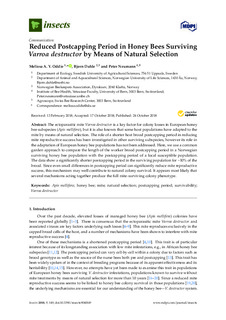| dc.contributor.author | Oddie, Melissa AY | |
| dc.contributor.author | Dahle, Bjørn Steinar | |
| dc.contributor.author | Neumann, Peter | |
| dc.date.accessioned | 2019-09-18T09:44:42Z | |
| dc.date.available | 2019-09-18T09:44:42Z | |
| dc.date.created | 2018-12-12T14:12:49Z | |
| dc.date.issued | 2018 | |
| dc.identifier.citation | Insects, 2018, 9(4). | nb_NO |
| dc.identifier.issn | 2075-4450 | |
| dc.identifier.uri | http://hdl.handle.net/11250/2617411 | |
| dc.description.abstract | The ectoparasitic mite Varroa destructor is a key factor for colony losses in European honey bee subspecies (Apis mellifera), but it is also known that some host populations have adapted to the mite by means of natural selection. The role of a shorter host brood postcapping period in reducing mite reproductive success has been investigated in other surviving subspecies, however its role in the adaptation of European honey bee populations has not been addressed. Here, we use a common garden approach to compare the length of the worker brood postcapping period in a Norwegian surviving honey bee population with the postcapping period of a local susceptible population. The data show a significantly shorter postcapping period in the surviving population for ~10% of the brood. Since even small differences in postcapping period can significantly reduce mite reproductive success, this mechanism may well contribute to natural colony survival. It appears most likely that several mechanisms acting together produce the full mite-surviving colony phenotype. | nb_NO |
| dc.language.iso | eng | nb_NO |
| dc.rights | Attribution-NonCommercial-NoDerivatives 4.0 Internasjonal | * |
| dc.rights.uri | http://creativecommons.org/licenses/by-nc-nd/4.0/deed.no | * |
| dc.title | Reduced postcapping period in honey bees surviving Varroa destructor by means of natural selection | nb_NO |
| dc.type | Journal article | nb_NO |
| dc.type | Peer reviewed | nb_NO |
| dc.description.version | publishedVersion | nb_NO |
| dc.source.pagenumber | 6 | nb_NO |
| dc.source.volume | 9 | nb_NO |
| dc.source.journal | Insects | nb_NO |
| dc.source.issue | 4 | nb_NO |
| dc.identifier.doi | 10.3390/insects9040149 | |
| dc.identifier.cristin | 1642247 | |
| dc.relation.project | Internasjonale institusjoner: Ricola Foundation Nature and Culture [Project Norway] | nb_NO |
| cristin.unitcode | 192,10,1,0 | |
| cristin.unitname | Institutt for husdyr- og akvakulturvitenskap | |
| cristin.ispublished | true | |
| cristin.fulltext | original | |
| cristin.qualitycode | 1 | |

